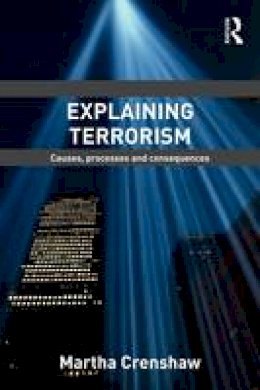
Stock image for illustration purposes only - book cover, edition or condition may vary.
Explaining Terrorism: Causes, Processes and Consequences
Martha Crenshaw
€ 61.53
FREE Delivery in Ireland
Description for Explaining Terrorism: Causes, Processes and Consequences
Paperback. Comprises some of the key essays on the causes, processes and consequences of terrorism by Professor Crenshaw, from 1972 onwards. This book is suitable for all students of political violence and terrorism, security studies and IR/politics in general. Series: Political Violence. Num Pages: 284 pages, 1 black & white tables. BIC Classification: JPWL. Category: (UP) Postgraduate, Research & Scholarly. Dimension: 233 x 156 x 15. Weight in Grams: 428.
This volume comprises some of the key essays by Professor Crenshaw, from 1972 to the present-day, on the causes, processes and consequences of terrorism. Since the early 1970s, scholars and practitioners have tried to explain terrorism and to assess the effectiveness of government responses to the threat. From its beginnings in a small handful of analytical studies, the research field has expanded to thousands of entries, with an enormous spike following the 9/11 attacks. The field of terrorism studies is now impressive in terms of quantity, scope, and variety. Professor Crenshaw had studied terrorism since the late 1960s, well before it was topical, and this selection of her work represents the development of her thought over time in four areas: defining terrorism and identifying its causes the different methods used to explain terrorism, including strategic, organisational and psychological approaches how campaigns of terrorism end how governments can effectively contribute to the ending of terrorism. This collection of essays by one of the pioneering thinkers in the field of terrorism studies will be essential reading for all students of political violence and terrorism, security studies and IR/politics in general.
Product Details
Publisher
Taylor & Francis Ltd United Kingdom
Number of pages
280
Format
Paperback
Publication date
2010
Series
Political Violence
Condition
New
Number of Pages
268
Place of Publication
London, United Kingdom
ISBN
9780415780513
SKU
V9780415780513
Shipping Time
Usually ships in 4 to 8 working days
Ref
99-2
About Martha Crenshaw
Martha Crenshaw is a Senior Fellow at the Center for International Security and Cooperation (CISAC) and the Freeman Spogli Institute for International Studies, and Professor of Political Science, by courtesy, at Stanford University. She is also Professor of Government Emerita at Wesleyan University. She is a lead investigator with the National Consortium for the Study of Terrorism and Responses to Terrorism (START) at the University of Maryland.
Reviews for Explaining Terrorism: Causes, Processes and Consequences
'The leading global thinker on the study of terrorism, Martha Crenshaw has for thirty years produced the most creative, rigorous and important contributions our field has known. And now these can all be found in one place. This book is simply the one indispensable text that every student, scholar and researcher of terrorism and political violence must have. Literally the best of the best.' - John Horgan, Pennsylvania State University, USA `Explaining terrorism requires an interdisciplinary approach able to address contextual causes, organizational dynamics and individual motifs. This combination of different levels of the analysis has been at the core of Martha Crenshaw's influential contributions to the field of terrorism study, the best of which are now collected in this precious volume.' - Donatella della Porta, European University Institute, Florence, Italy 'When it comes to the study of terrorism from a genuine social science perspective, professor Martha Crenshaw is the scholar of reference and became so long before the field gained academic centrality worldwide after 9/11.' - Fernando Reinares, Universidad Rey Juan Carlos, Madrid, Spain In this important volume, the author, a prominent academic expert on terrorism, has assembled her articles, many of which were previously published in the 1980s and 1990s, with a few published after 2001. The result is a comprehensive compilation that is divided into four parts - Joshua Sinai, `Terrorism Bookshelf: Top 150 Books on Terrorism and Counterterrorism', Perspectives on Terrorism, Vol. 6, No. 2 (2012)
